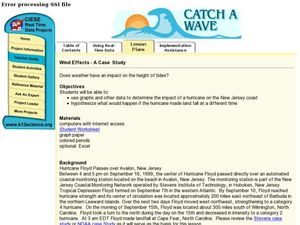Curated OER
Lesson Plan #3 ~ Ocean Currents
Sixth graders experiment to understand the ocean's currents. In this ocean current activity, 6th graders complete an experiment with two bottles of water and an index card to discover information about the ocean current. Students...
Curated OER
Telling Tides
An excellent lesson tidal patterns is here for your middle and high schoolers. In it, learners read a tide chart, determine the high and low tides for a particular place, and learn how to correct for differences in tidal times and...
American Museum of Natural History
What do You Know About Marine Biology
Show me what you know about the sea. Learners answer 10 questions about marine biology. The questions range from what evidence points to the origin of life to the biggest threat to oceans.
NOAA
Investigating Sea Level Using Real Data
The news reports on rising sea level, but how do scientists measure this rise? Scholars use NOAA data including maps, apps, and images to work through five levels of activities related to sea level. Each level in the series adds a new...
PBS
Coastline Change
Continental drift happens over millions of years, but new perspective shows much faster changes. An informative resource offers a short term perspective using a series of satellite images. Viewers observe major changes to a coastline in...
Science 4 Inquiry
The Impact of the Sun and Moon on Tides
In 150 BC, Seleucus of Seleucia theorized that the moon causes the tides. Scholars learn about what causes tides by studying the interactions of gravity between the sun, moon, and Earth. They use technology to formalize otherwise...
NOAA
Energy from the Oceans
Can Earth's oceans produce a steady supply of clean energy? Scholars explore the uses of tidal and thermal energy in the 11th installment of a 13-part series about ocean-based alternative energy sources. Learners examine the current...
NOAA
Tides
Sometimes low, sometimes high, but always in motion! Explore Earth's tidal system in the 10th interactive in a series of 13. Engaging life and earth science students alike, the versatile resource demonstrates cause and effect between...
NOAA
Ocean Currents
Go with the flow! The eighth installment in a 13-part series has earth science students dive in to the world's system of ocean currents. The interactive illustrates the different types and depths of currents, how wind and gravity...
University of Southern California
What Is The Ocean?
Go on a tour of the ocean through the lens of a scientist. Learners read maps of the ocean floor, study tide behavior, examine wave motion, and analyze components of soil. Each lesson incorporates a hands-on component.
Columbus City Schools
Totally Tides
Surf's up, big kahunas! How do surfers know when the big waves will appear? They use science! Over the course of five days, dive in to the inner workings of tidal waves and learn to predict sea levels with the moon as your guide.
K5 Learning
Why Does the Ocean have Waves?
Six short answer questions challenge scholars to show what they know after reading an informational text that examines waves—what they are, what causes them, and how different Earth factors affect their size and strength.
Space Awareness
Navigation in the Ancient Mediterranean and Beyond
Ancient texts, like Homer's Odyssey, mentions navigating ships by observing constellations. Pupils learn about the link between history and astronomy as they relate to navigation in the Bronze Age. Scholars complete two hands-on...
NOAA
Tides
Low tides, high tides, spring tides, neap tides, diurnal tides, semidiurnal tides, mixed tides ... just how many types of tides are there? The 10th installment of a 23-part NOAA Enrichment in Marine sciences and Oceanography (NEMO)...
Curated OER
The Oceans, Waves, Tides & Currents
Your introductory lesson to oceanography can be outlined with this apropos presentation. It touches on the physical features of the ocean floor, waves, tides, and currents. One small issue is that some of the graphics are not of the...
Curated OER
Oceans: Water, Water Everywhere. . . but Only on the Earth!
It's not long, but it's thorough! This PowerPoint takes 4th - 8th grade earth scientists deeper into the oceans. They learn about tide and current activity and the forces that drive them. They also discover how wind and the rotation of...
Curated OER
Regents High School Examination: Physical Setting Earth Science 2006
Test your class on earth science with this extensive resource. This test, created by The University of the State of New York Regents, is made up of 50 multiple choice questions and 32 short answer questions that cover the branches of...
Curated OER
Wind Effects- A Case Study
Learners explore hurricanes. In this weather data interpretation lesson, students draw conclusions about the impact of Hurricane Floyd as it related to weather conditions. Learners read and interpret a tide data table, a barometric...
Curated OER
Seas in Motion
Young scholars analyze wave movement. In this Science lesson, students use items that float to observe waves and currents. Young scholars record and discuss their observations.
Curated OER
Tides - The Ins and Outs of Tides
Get your junior oceanographers to generate tidal prediction graphs on an interactive website. They will feel like experts in the field, or shall we say, experts in the ocean! This is a brief, but worthwhile activity that could be used to...
Mr. E. Science
The Earth in Space
Do you think Earth makes fun of other planets for having no life? The presentation covers the rotation and revolution of both the earth and our moon. It provides explanations for seasons, tides, and eclipses. Lesson is the 20th in a...
Curated OER
The Work of Waves and Wind
This is not revolutionary, but it is informative. Earth science viewers in grades 7-12 get carried away with wave and wind erosion. They view diagrams of how waves impact ocean shorelines. They see examples of the different types of sand...
Curated OER
Coastal Processes
Hold onto your hats for an in-depth look at erosion and sediment deposition along ocean shores! It begins with four pages of vocabulary definitions and describes the coastal profile. It delves into the different ways that sediments are...
Curated OER
Survival Zone: The Intertidal Zone
Students determine water level tidal predictions for a given place for the next month, current status of the area and the local weather. Links are provided for the information. Students answer questions based on the information found,...

























